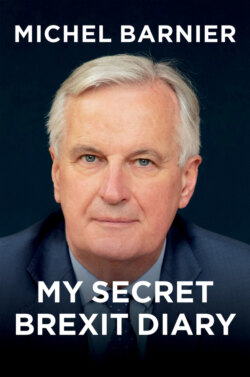Читать книгу My Secret Brexit Diary - Michel Barnier - Страница 37
Wednesday, 30 November 2016: Facing the press
ОглавлениеFor the first time since I took office, this morning I am speaking to the press, having been invited by Jean-Claude Juncker to present the progress of our work to the College of Commissioners.
The Berlaymont press room is packed. Journalists have come from all over Europe, some from further afield. There is a burst of flash photography. The Greek spokesman for the Commission, Margaritis Schinas, hands over to me. I choose to open this first briefing in English.
I admit that I still have some progress to make in this language. I did have a good teacher, though: on one occasion I received a sort of personal English lesson from the Queen of England herself! It was Tuesday, 6 April 2004 and Prime Minister Jean-Pierre Raffarin was hosting a lunch in honour of Her Majesty Queen Elizabeth, who had come to Paris to mark the centenary of the Entente Cordiale.
As Foreign Secretary, I had the honour of being seated to the right of the Queen, who speaks impeccable French. As I had to go straight after lunch to the National Assembly to discuss current affairs, my intention was to give a special greeting to a delegation from the House of Lords and the House of Commons who would be attending the session for a while from the gallery.
‘Ma’am, may I ask, how you would say in English “Vive l’Entente cordiale”?’
‘You would say “Long live the Entente Cordiale”’, the Queen immediately replied.
With this very special lesson in English under my belt, I repeated the phrase a few minutes later before the Chamber, looking out at the British MPs – somewhat to the surprise of some French MPs and journalists, many of whom thought that I had made a mistake and that the correct phrase should have been ‘Long life to the Entente Cordiale’.
This episode was even reported in the humour magazine Le Canard enchaîné, which mistakenly mocked the foreign minister for his poor English.
But I never could have dreamt of having such an eminent teacher…
This meeting with journalists is an important moment, an opportunity to set the record straight, given the amount of ‘fake news’ that Brexit is provoking.
Today’s speech gives me the opportunity to let everyone know my state of mind: neither aggression, nor naivety, nor revenge. I want to remain calm in all circumstances. And Georg has devised a nice phrase that will do the rounds of the news channels: ‘Keep calm and negotiate.’ A nice invitation to the negotiating table, and a little jab at the British… Stefaan De Rynck will later get a bright red mug made for me emblazoned with the slogan, which I will keep prominently on my desk.
This press conference is also an occasion for me to play teacher, explaining the difference between withdrawal – the terms of which must be set out within a two-year period – and our future relationship – which will no doubt take longer to negotiate.
Finally, I use it as an opportunity to draw attention to the countless consequences of Brexit: human, social, economic and financial, technical and legal. And to list the main issues that we will need to work on in the run-up to withdrawal: the rights of European citizens in the UK and of British citizens in the EU; settlement of the financial commitments made by the UK to the Union as a member state; and the future of the Union’s new borders, particularly in Ireland.
I then head to the European Parliament to meet with the presidents of the political groups, after having spoken yesterday with President Martin Schulz and set out the inter-institutional working method I want to put in place. Schulz, always very European and direct, assured me of his trust. Around the table today I find other parliamentarians I have known for a long time: Guy Verhofstadt, Manfred Weber, Gianni Pittella, Philippe Lamberts, Gabriele Zimmer, Danuta Hübner…
They give me a warm and friendly welcome. They all know how much importance I attach to the work of the European Parliament, having always been convinced, in all my previous roles, that it has a crucial part to play in the balance of the institutions.
This is all the more true in the context of these negotiations, since it will be up to the European Parliament to ratify the Withdrawal Agreement. We are all fully aware of the political balance that must be maintained, and we agree to meet regularly to collaborate on refining the positions that it will be my job to put forward and defend.
